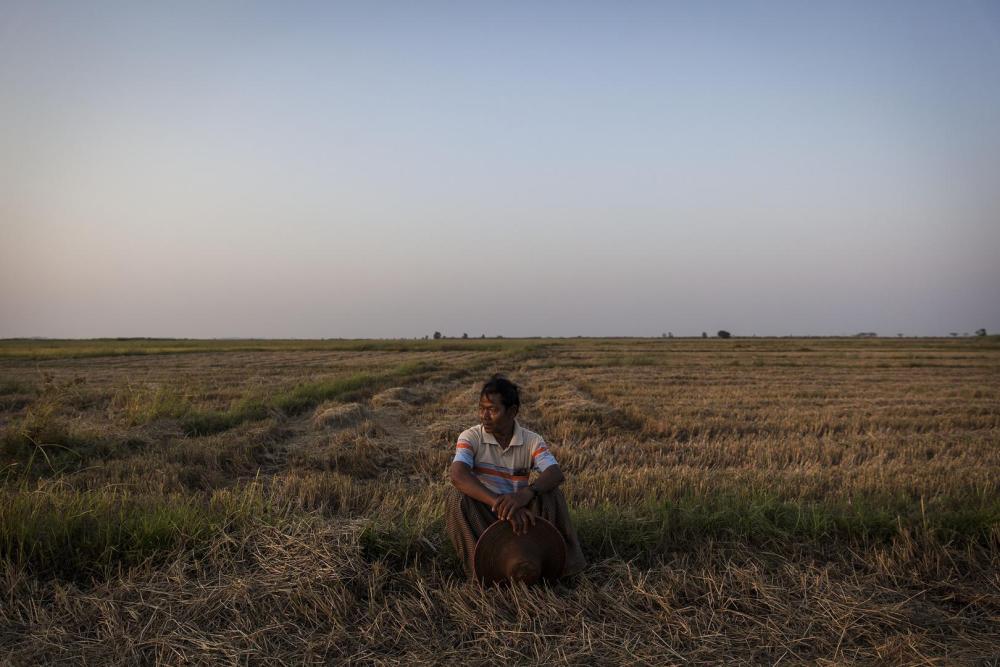 La Win, 61, a farmer from the Ayeyarwady Region, sits on a portion of the 35 acres of land he said was taken from him in 2004 by a company. When asked about the effect of the seizure of the land he said, “I suffered great losses in every aspect of my life.” La Win had been working on the land for more than 14 years before it was confiscated. Unable to farm, he started working as a manual laborer, weaving together thatch walls, and occasionally fishing. He said he now earns no more than 4500 kyat (US$3.20) per day.
© 2017 Patrick Brown for Human Rights Watch
La Win, 61, a farmer from the Ayeyarwady Region, sits on a portion of the 35 acres of land he said was taken from him in 2004 by a company. When asked about the effect of the seizure of the land he said, “I suffered great losses in every aspect of my life.” La Win had been working on the land for more than 14 years before it was confiscated. Unable to farm, he started working as a manual laborer, weaving together thatch walls, and occasionally fishing. He said he now earns no more than 4500 kyat (US$3.20) per day.
© 2017 Patrick Brown for Human Rights Watch
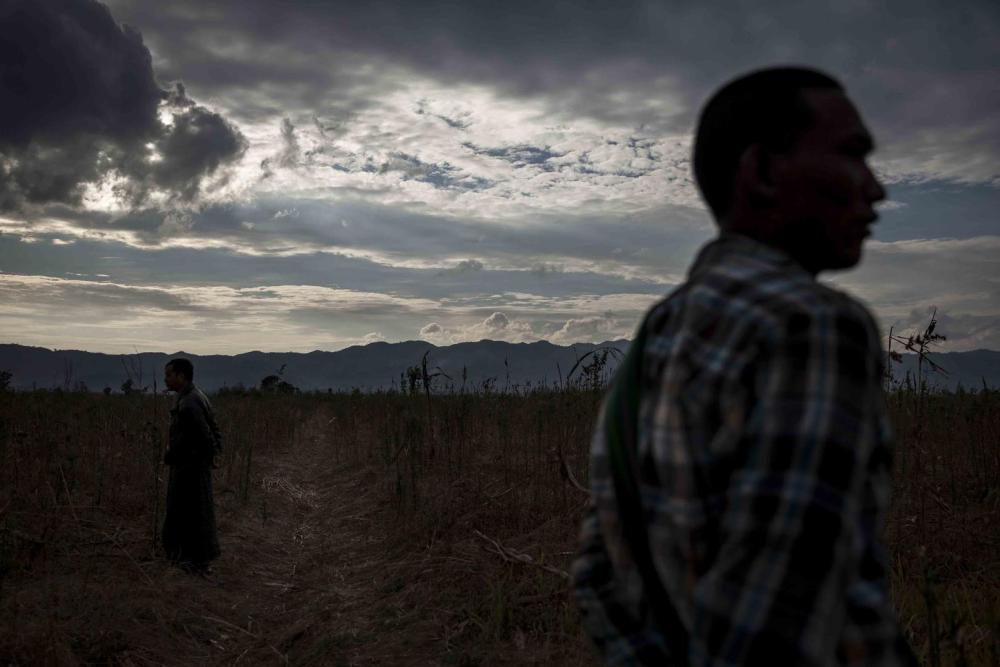 Thein Tun, 41, a farmer from Shan State, was jailed for one month for trespassing on land he says his family has owned for decades. After his release, soldiers threatened to evict him and his family.
© 2017 Patrick Brown for Human Rights Watch
Thein Tun, 41, a farmer from Shan State, was jailed for one month for trespassing on land he says his family has owned for decades. After his release, soldiers threatened to evict him and his family.
© 2017 Patrick Brown for Human Rights Watch
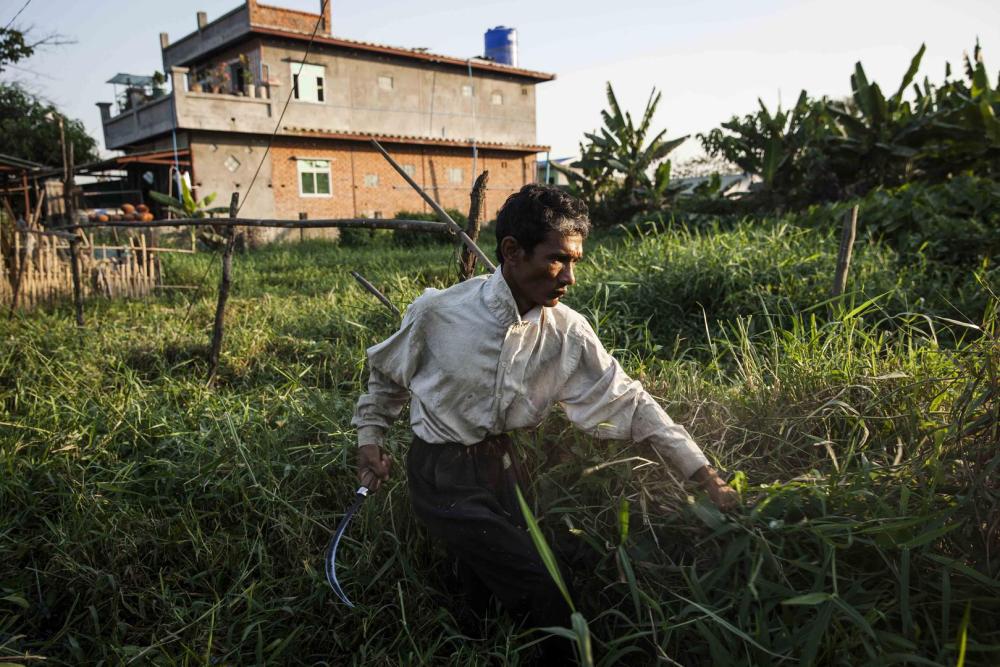 Thein Myint, 44, a farmer from Hlaing Thayar Township in the Yangon Region, had several acres of land taken from his family in 1991 by the State Law and Order Restoration Council (SLORC) military government. The government eventually sold the land his family once farmed, and new owners fenced off the land and built factories and other structures. To support his family, he now collects and sells grass from nearby empty lots, earning no more than a few thousand kyat per day.
© 2017 Patrick Brown for Human Rights Watch
Thein Myint, 44, a farmer from Hlaing Thayar Township in the Yangon Region, had several acres of land taken from his family in 1991 by the State Law and Order Restoration Council (SLORC) military government. The government eventually sold the land his family once farmed, and new owners fenced off the land and built factories and other structures. To support his family, he now collects and sells grass from nearby empty lots, earning no more than a few thousand kyat per day.
© 2017 Patrick Brown for Human Rights Watch
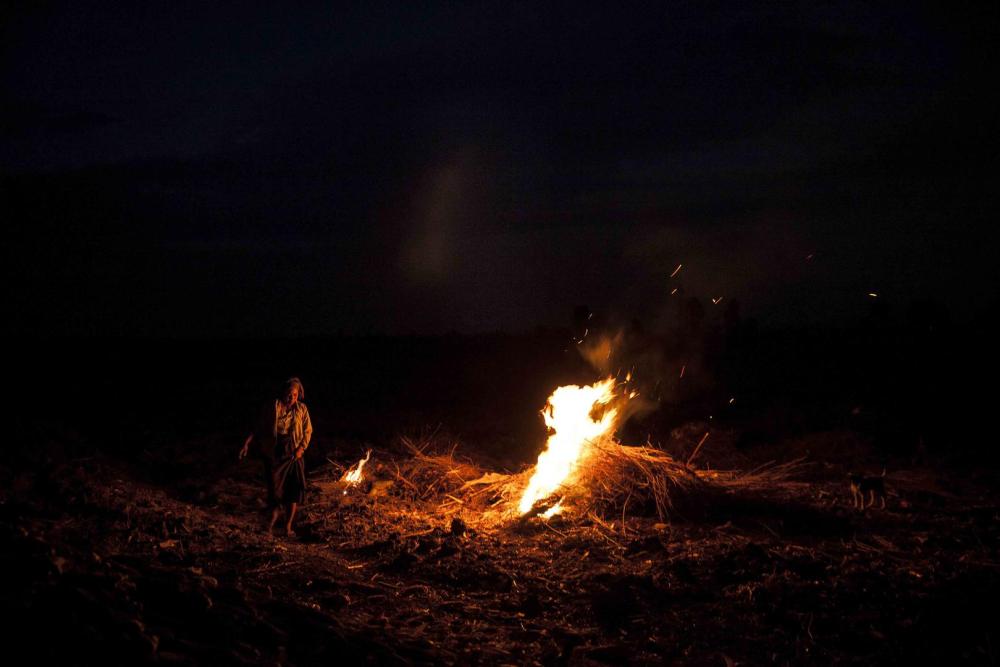 A fire burns in southern Shan State on land the Myanmar military now claims it owns, though local farmers have lived and worked on the land for decades.
© 2017 Patrick Brown for Human Rights Watch
A fire burns in southern Shan State on land the Myanmar military now claims it owns, though local farmers have lived and worked on the land for decades.
© 2017 Patrick Brown for Human Rights Watch
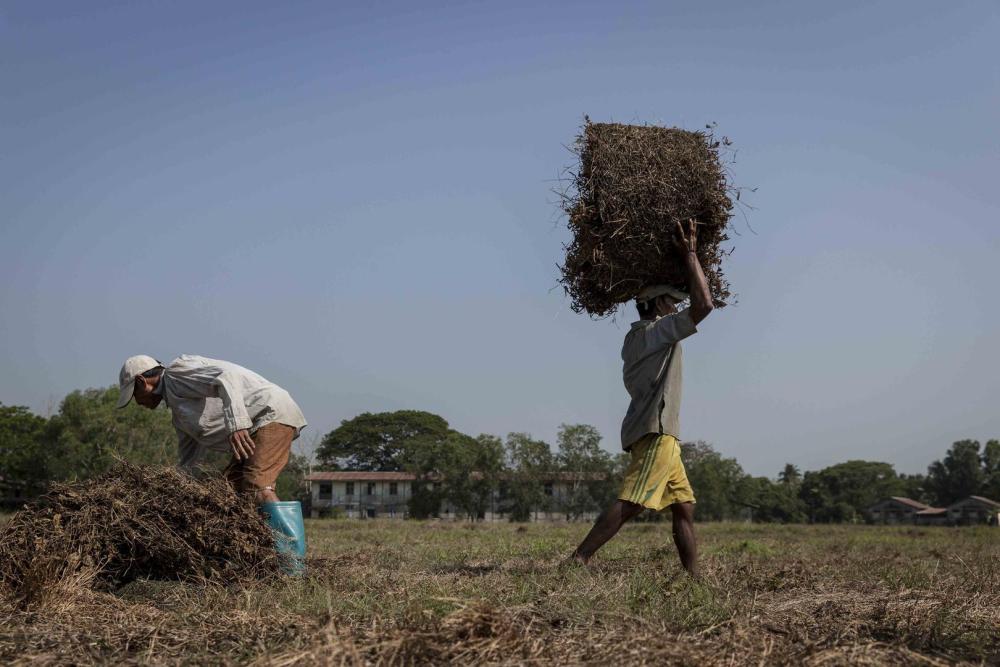 Farmers wrap and transport crops from a field in the Ayeyarwady Region.
© 2017 Patrick Brown for Human Rights Watch
Farmers wrap and transport crops from a field in the Ayeyarwady Region.
© 2017 Patrick Brown for Human Rights Watch
 Ma Mau Oo, 46, a farmer from Shan State, said the military took 12 acres from her family in 2005. Since then, she has sent over a dozen letters to the government requesting that the land be returned to her family. “I keep sending letters because I want the higher ranks to know what’s happening,” she said.
© 2017 Patrick Brown for Human Rights Watch
Ma Mau Oo, 46, a farmer from Shan State, said the military took 12 acres from her family in 2005. Since then, she has sent over a dozen letters to the government requesting that the land be returned to her family. “I keep sending letters because I want the higher ranks to know what’s happening,” she said.
© 2017 Patrick Brown for Human Rights Watch
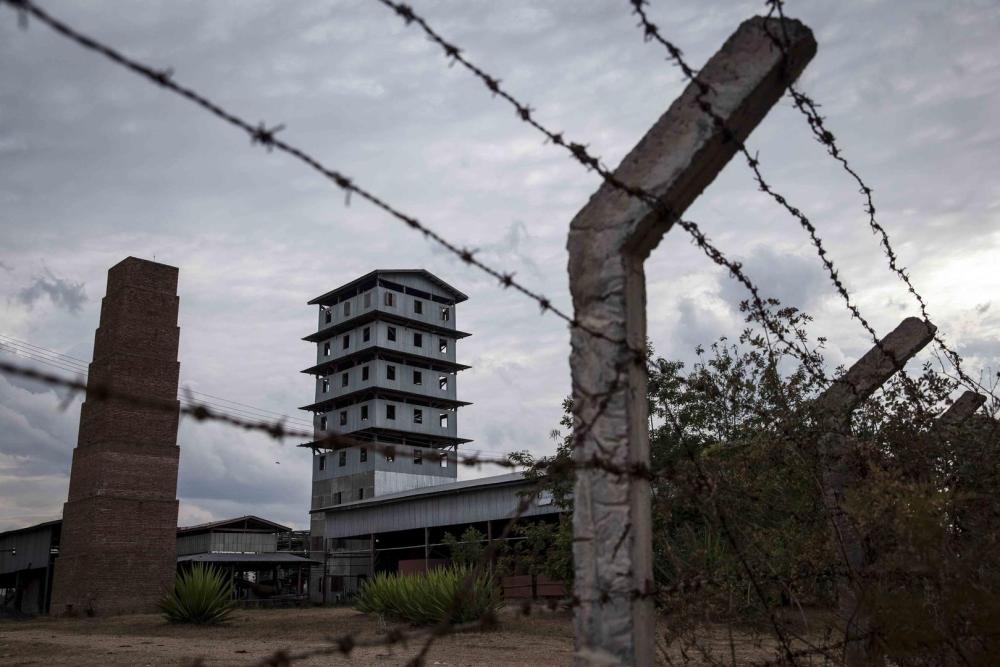 Barbed wire surrounds a factory in southern Shan State built on land that farmers report was confiscated by the military in 2004.
© 2017 Patrick Brown for Human Rights Watch
Barbed wire surrounds a factory in southern Shan State built on land that farmers report was confiscated by the military in 2004.
© 2017 Patrick Brown for Human Rights Watch
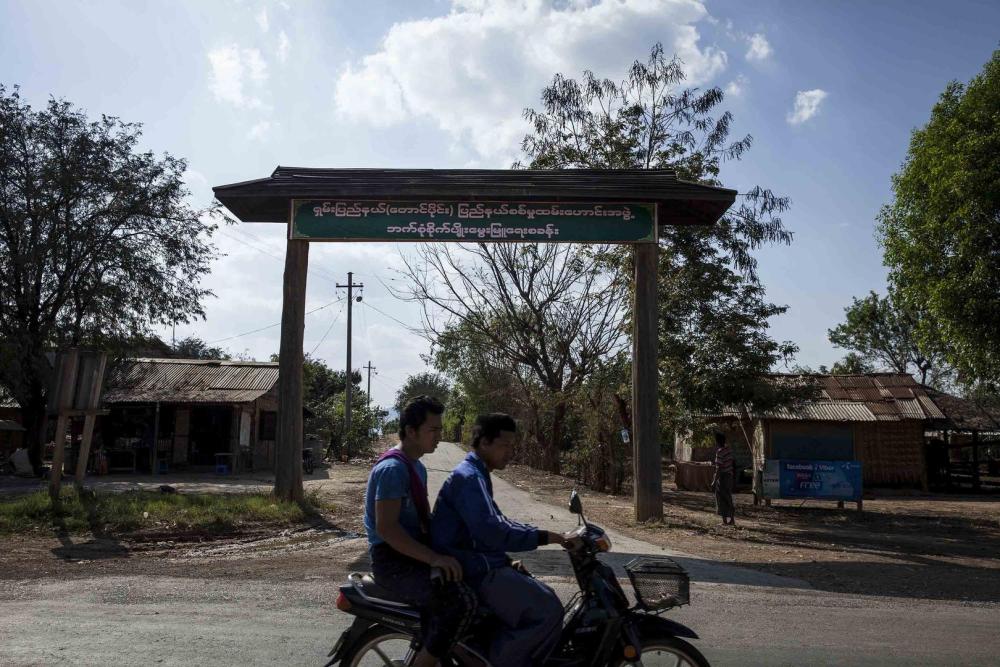 Villagers ride past the entrance to a vast area of farmland that local residents said the government confiscated from them in southern Shan State. The government subsequently designated the land for use by Myanmar military’s veterans.
© 2017 Patrick Brown for Human Rights Watch
Villagers ride past the entrance to a vast area of farmland that local residents said the government confiscated from them in southern Shan State. The government subsequently designated the land for use by Myanmar military’s veterans.
© 2017 Patrick Brown for Human Rights Watch
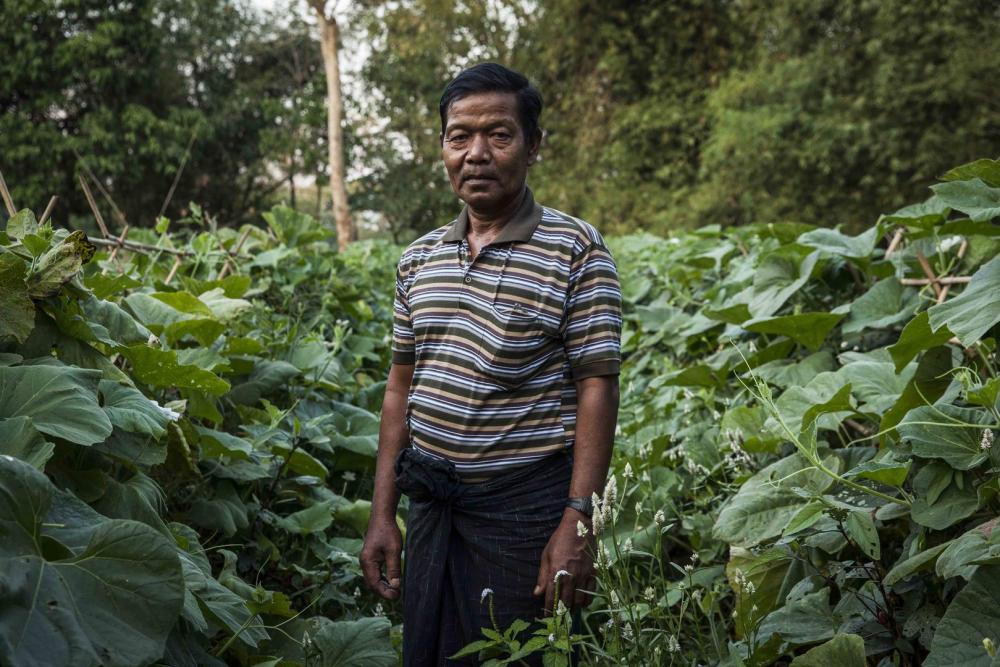 La Win, 61, a farmer from the Ayeyarwady Region, spent four years clearing 35 acres of land in 1991. He said that in 2004 a company took the land from him. He received no compensation for the land, which was just one parcel in a broader swath of land confiscated by the company in the region. He has filed countless claims with the government in attempts to get his land back to no avail. Since he is unable to farm his land, he now works as a manual laborer, weaving together thatch walls, and occasionally fishing.
© 2017 Patrick Brown for Human Rights Watch
La Win, 61, a farmer from the Ayeyarwady Region, spent four years clearing 35 acres of land in 1991. He said that in 2004 a company took the land from him. He received no compensation for the land, which was just one parcel in a broader swath of land confiscated by the company in the region. He has filed countless claims with the government in attempts to get his land back to no avail. Since he is unable to farm his land, he now works as a manual laborer, weaving together thatch walls, and occasionally fishing.
© 2017 Patrick Brown for Human Rights Watch
 Sunset falls on La Win, 61, a farmer from the Ayeyarwady Region, on the 35 acres of land that he said a company seized from him in 2004.
© 2017 Patrick Brown for Human Rights Watch
Sunset falls on La Win, 61, a farmer from the Ayeyarwady Region, on the 35 acres of land that he said a company seized from him in 2004.
© 2017 Patrick Brown for Human Rights Watch
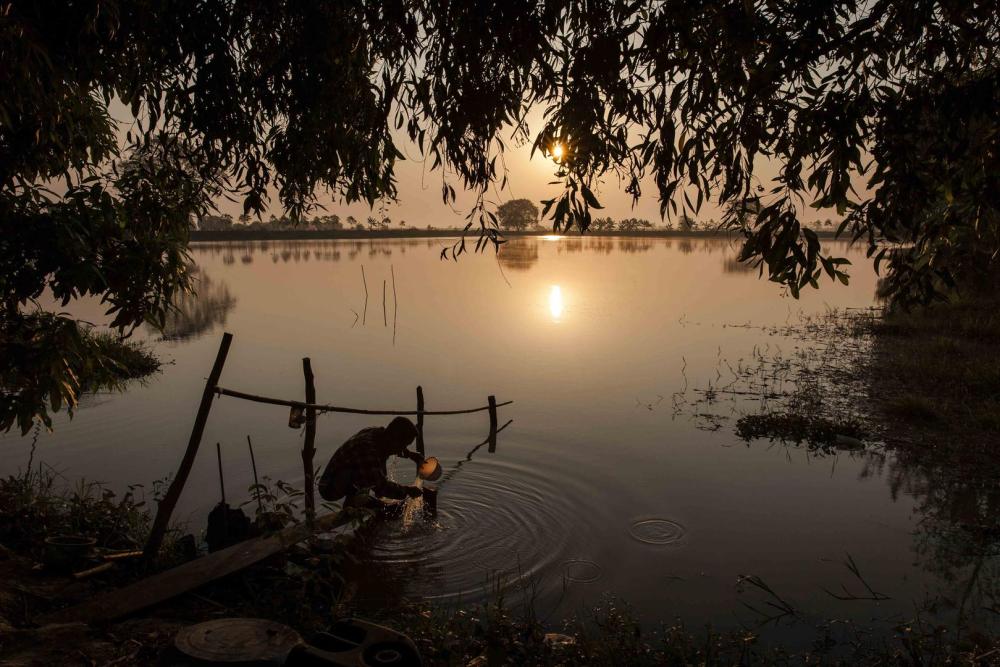 The sun rises over the Ayeyarwady Region’s many fishponds where countless villagers had their once-verdant farmlands confiscated by military-backed ministries and soldiers in the 1990s. Few plots of land have been returned to their original owners who were all denied adequate compensation for their land.
© 2017 Patrick Brown for Human Rights Watch
The sun rises over the Ayeyarwady Region’s many fishponds where countless villagers had their once-verdant farmlands confiscated by military-backed ministries and soldiers in the 1990s. Few plots of land have been returned to their original owners who were all denied adequate compensation for their land.
© 2017 Patrick Brown for Human Rights Watch
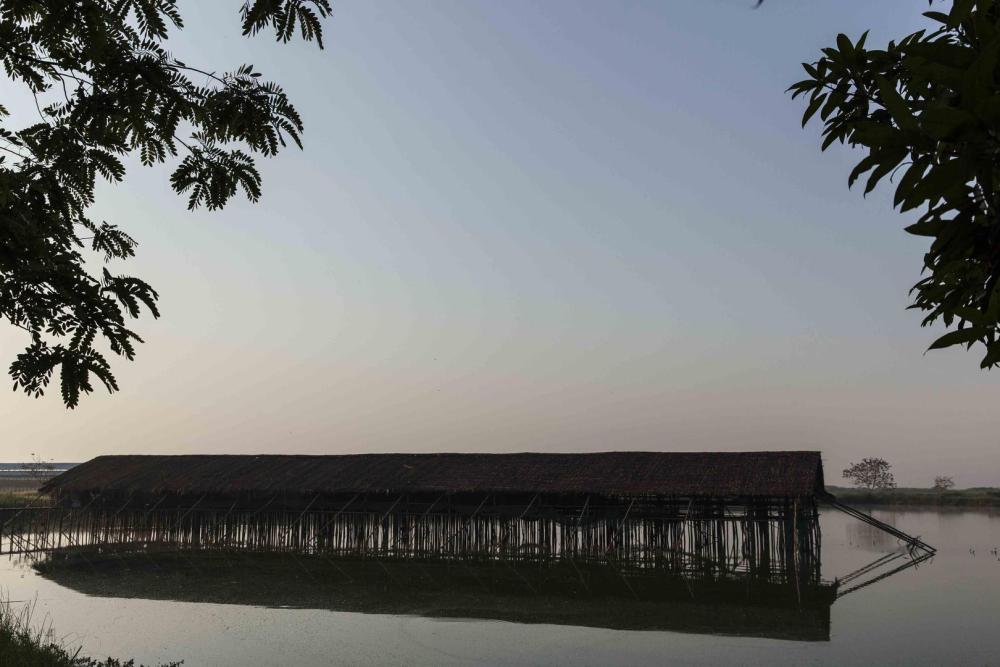 One of the Ayeyarwady Region’s many fishponds where countless villagers had their farmlands confiscated by State Law and Order Restoration Council (SLORC) ministries and soldiers in the 1990s. Some farmers were effectively forced to dig ponds on their own lands. The government and military have refused in all but a few cases to return these confiscated lands to their original owners.
© 2017 Patrick Brown for Human Rights Watch
One of the Ayeyarwady Region’s many fishponds where countless villagers had their farmlands confiscated by State Law and Order Restoration Council (SLORC) ministries and soldiers in the 1990s. Some farmers were effectively forced to dig ponds on their own lands. The government and military have refused in all but a few cases to return these confiscated lands to their original owners.
© 2017 Patrick Brown for Human Rights Watch
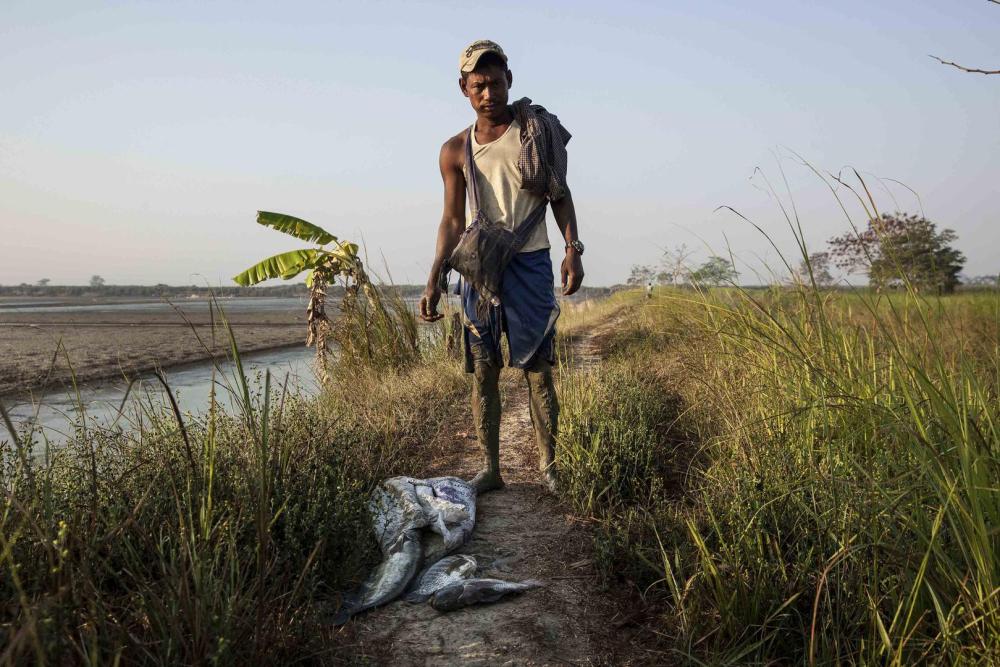 A man displays his catch in the Ayeyarwady Region where countless acres of farmland were confiscated without notice or compensation and turned into fishponds.
© 2017 Patrick Brown for Human Rights Watch
A man displays his catch in the Ayeyarwady Region where countless acres of farmland were confiscated without notice or compensation and turned into fishponds.
© 2017 Patrick Brown for Human Rights Watch
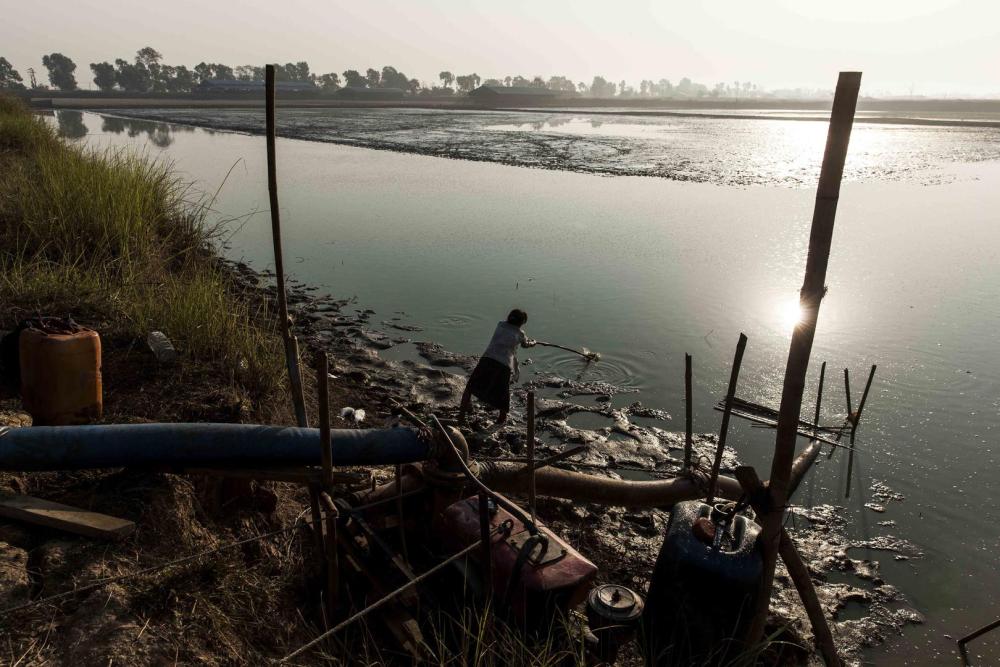 A farmer tends a fishpond in the Ayeyarwady Region where untold amounts of land have been confiscated since the early 1990s.
© 2017 Patrick Brown for Human Rights Watch
A farmer tends a fishpond in the Ayeyarwady Region where untold amounts of land have been confiscated since the early 1990s.
© 2017 Patrick Brown for Human Rights Watch
 Maung Win, 63, a farmer from the Kyaunggon Township in the Ayeyarwady, said he had his land taken by the government in 1992. He and his family had been working on the land for decades before it was seized. He said that like the other villagers in the area, the government required him to “volunteer” to dig fish ponds on the farmland. He received no prior notice that his land would be confiscated. “It is like our hands are broken because we depend on these lands,” he said.
© 2017 Patrick Brown for Human Rights Watch
Maung Win, 63, a farmer from the Kyaunggon Township in the Ayeyarwady, said he had his land taken by the government in 1992. He and his family had been working on the land for decades before it was seized. He said that like the other villagers in the area, the government required him to “volunteer” to dig fish ponds on the farmland. He received no prior notice that his land would be confiscated. “It is like our hands are broken because we depend on these lands,” he said.
© 2017 Patrick Brown for Human Rights Watch
 Thein Win, 60, a farmer from Kyaunggon Township in the Ayeyarwady Region, said he had 12 acres of land seized from him by the State Law and Order Restoration Council (SLORC) military government in 1992. They used the lands they took from him and other villagers for fishponds. When he complained about the land confiscation, authorities threatened to arrest him. Eventually, the government required him to “volunteer” to dig his own land up to create the fishponds. He said he never received any compensation for the land taken from him: “We got nothing. We literally got nothing for our land.”
© 2017 Patrick Brown for Human Rights Watch
Thein Win, 60, a farmer from Kyaunggon Township in the Ayeyarwady Region, said he had 12 acres of land seized from him by the State Law and Order Restoration Council (SLORC) military government in 1992. They used the lands they took from him and other villagers for fishponds. When he complained about the land confiscation, authorities threatened to arrest him. Eventually, the government required him to “volunteer” to dig his own land up to create the fishponds. He said he never received any compensation for the land taken from him: “We got nothing. We literally got nothing for our land.”
© 2017 Patrick Brown for Human Rights Watch
 Kyaw Ohn, 46, a farmer from Kyaunggon Township in the Ayeyarwady Region, said he had over 10 acres confiscated from him by the military government in the early 1990s. Since then, he has farmed a much smaller plot of land and works as a day laborer. He and his family received no compensation or substitute land for the seizure of the land they depended on for their livelihood. He said his complaints to the government have received no response.
© 2017 Patrick Brown for Human Rights Watch
Kyaw Ohn, 46, a farmer from Kyaunggon Township in the Ayeyarwady Region, said he had over 10 acres confiscated from him by the military government in the early 1990s. Since then, he has farmed a much smaller plot of land and works as a day laborer. He and his family received no compensation or substitute land for the seizure of the land they depended on for their livelihood. He said his complaints to the government have received no response.
© 2017 Patrick Brown for Human Rights Watch
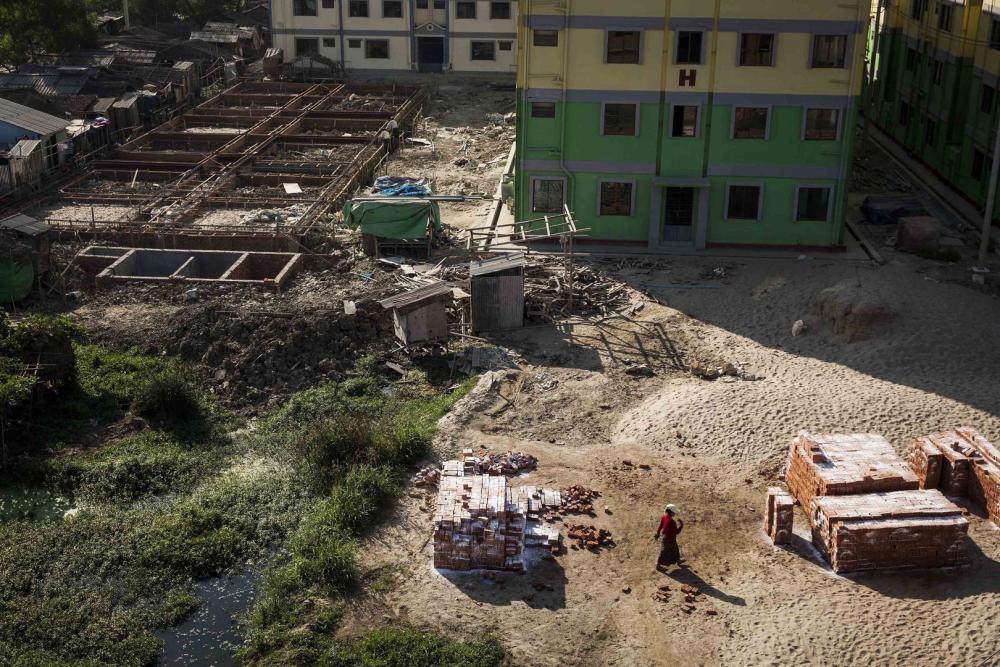 Low-income housing being built on land on the outskirts of Yangon from which previous residents in makeshift homes were displaced. The displaced community, who were told by company staff and local authorities they could relocate a few hundred meters away on an old landfill, still resides in the shadow of the new housing. Residents had to build a makeshift bamboo walkway to avoid having to walk on the trash underneath their homes and all around them. The communities were paid little in compensation for the relocation and considerably suffered through the ordeal.
© 2017 Patrick Brown for Human Rights Watch
Low-income housing being built on land on the outskirts of Yangon from which previous residents in makeshift homes were displaced. The displaced community, who were told by company staff and local authorities they could relocate a few hundred meters away on an old landfill, still resides in the shadow of the new housing. Residents had to build a makeshift bamboo walkway to avoid having to walk on the trash underneath their homes and all around them. The communities were paid little in compensation for the relocation and considerably suffered through the ordeal.
© 2017 Patrick Brown for Human Rights Watch
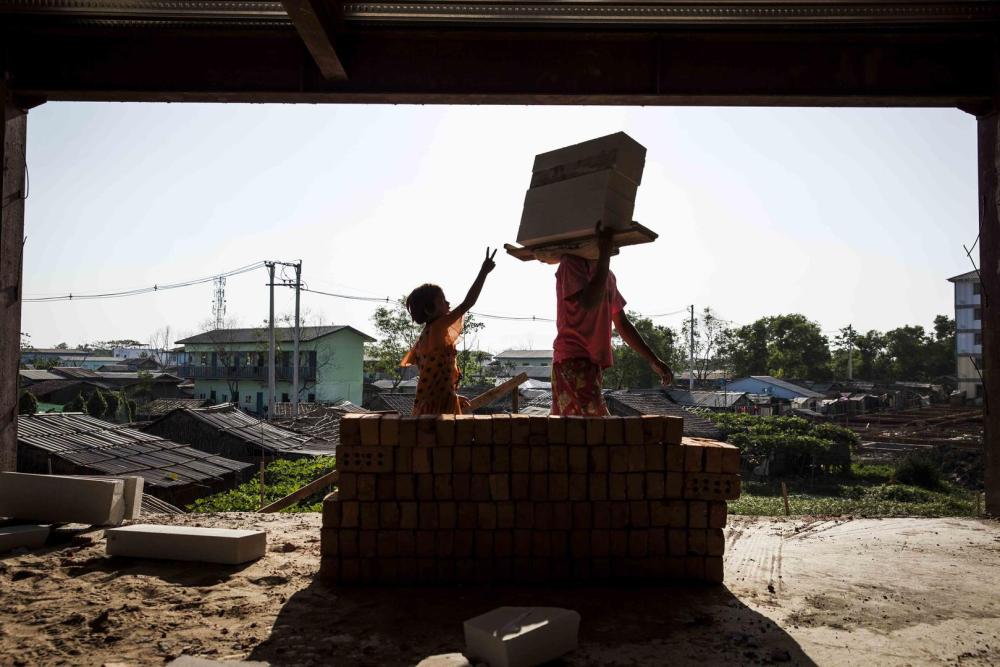 Laborers on the outskirts of Yangon build low-income housing brick-by-brick, while nearby homes of displaced residents sit on an old trash dump.
© 2017 Patrick Brown for Human Rights Watch
Laborers on the outskirts of Yangon build low-income housing brick-by-brick, while nearby homes of displaced residents sit on an old trash dump.
© 2017 Patrick Brown for Human Rights Watch
 Thein Myint, 44, a farmer from Hlaing Thayar Township in Yangon Region, said he has been trying for years to get just a portion of the land his family farmed returned after it was taken in 1991 by the military government. The government eventually sold the land, and new owners fenced off the land and built factories and other structures. He said none of his family’s land had been returned and no offers of compensation had been made to him.
© 2017 Patrick Brown for Human Rights Watch
Thein Myint, 44, a farmer from Hlaing Thayar Township in Yangon Region, said he has been trying for years to get just a portion of the land his family farmed returned after it was taken in 1991 by the military government. The government eventually sold the land, and new owners fenced off the land and built factories and other structures. He said none of his family’s land had been returned and no offers of compensation had been made to him.
© 2017 Patrick Brown for Human Rights Watch



















